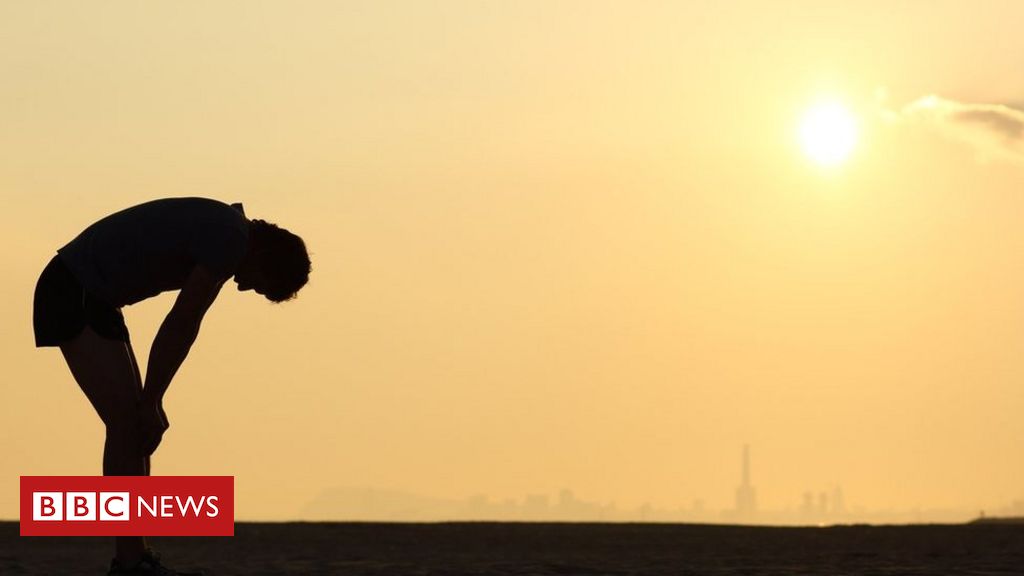How exercise helps you sleep better
4 min read
- Emma Sweeney
- Conversation*

attributed to him, Getty Images
Many people have trouble getting good sleep.
Not only does getting enough sleep leave us feeling tired the next day, but it can also have negative effects on other aspects of our health and well-being in the long run.
People hear many things they can do to get a better night’s sleep, from taking a hot shower at night to leaving their cell phones off a couple of hours before bed.
But one of the most common tips for people who find it difficult to get a good night’s sleep is to exercise regularly. And research suggests that this is really very good advice.
For example, a 2015 meta-analysis looked at all existing research on exercise, sleep duration and quality. It has shown that exercise, whether regular (a few sessions per week) or occasional, can improve sleep.
This means that even one exercise can be enough to improve sleep, both in terms of quality and duration.
Research also indicates the types of exercise that can help improve sleep. For example, regular aerobic exercise has been shown to help people fall asleep faster, wake up less during the night, and feel more rested the next morning.
These effects have been demonstrated by many different types of aerobic exercise, such as cycling, running, and even brisk walking. Even a simple 30-minute session of aerobic exercise, once, can improve many aspects of sleep.
Although this session is not as intense as regular aerobic exercise, this session is still shown to increase sleep duration, decrease the time it takes to fall asleep, and increase sleep efficiency (the percentage of time spent in bed actually sleeping). Higher sleep efficiency indicates better sleep.
Research on resistance exercise (such as weightlifting) and its effects on sleep is very limited. But given the small number of studies that have been done, it appears that resistance exercise may also be able to improve sleep.
Studies have concluded that people who do resistance exercise regularly (about three sessions per week) have better subjective sleep quality. Even the thought of getting good sleep can affect your performance throughout the day.
Regular resistance exercises can help people with insomnia fall asleep faster and increase sleep efficiency. But there is still little research in this area, so we need to exercise caution before drawing any conclusions.
The good news is that the benefits of exercise for sleep appear to benefit everyone, regardless of their age or potential sleep disturbances (such as insomnia or sleep apnea).
The effect of the exercises
attributed to him, David Madison
While research clearly indicates that exercise can improve our sleep, scientists still aren’t entirely sure how it works — but they do have a few theories.
Our body’s sleep-wake cycle follows an approximate 24-hour period, which is controlled by an internal “clock” in the body. As part of this cycle, a hormone called melatonin is released at night, which helps us feel tired.
Exercising during the day can release melatonin earlier at night, which may be why people who exercise fall asleep faster.
Also, exercise raises the body temperature. But when we finish exercising, our body temperature begins to return to normal.
A decrease in body temperature can also help us sleep. It may explain why exercising earlier in the evening can help some people sleep better, contrary to popular belief.
Exercise can also improve sleep due to its positive effects on mood and mental health, which can be linked to sleep quality. That’s because during exercise, the body releases mood-boosting substances known as endorphins.
Regular exercise can reduce symptoms of anxiety and depression. Thus, the positive impact of physical exercise on mood and mental health can help people fall asleep more easily.
While more research is still needed to determine why different types of exercise affect so many different aspects of our sleep, it is clear that exercise can be beneficial for sleep. Doing just 30-60 minutes of daily exercise can help you fall asleep faster, stay asleep through the night, and wake up feeling more rested the next morning.
While a single bout of exercise can improve sleep, regular exercise is likely to provide greater improvements. Since many exercises are linked to better sleep, all you have to do is choose the type you enjoy, whether it’s running, swimming, weightlifting, or just a brisk walk.
* Emma Sweeney is Professor of Exercise, Nutrition and Health at Nottingham Trent University in the United Kingdom.

“Entrepreneur. Music enthusiast. Lifelong communicator. General coffee aficionado. Internet scholar.”

:strip_icc()/s04.video.glbimg.com/x720/11792055.jpg)

:strip_icc()/s03.video.glbimg.com/x720/11786998.jpg)



